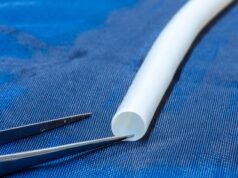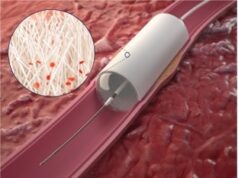Bluegrass Vascular Technologies has announced patient enrolment in the first clinical study of its Surfacer Inside-Out access catheter system, a proprietary system that allows physicians to perform a novel “inside-out” approach to gain venous access.
The prospective single-centre feasibility study will evaluate the safety and effectiveness of the Surfacer in up to 10 patients with upper extremity venous occlusion. Conducted by principal investigator Adrian Ebner at the Sanitorio Italiano in Asunción, Paraguay, the study commenced with the successful treatment of six patients in early December.
“Our early experience with the Surfacer has shown it to hold significant promise for regaining access in patients whose veins have become totally compromised with occlusion, thereby limiting their ability to receive critical vascular access therapies such as dialysis and intravenous chemotherapy,” said Ebner. “The Surfacer’s unique inside-out approach is minimally invasive and simple to perform, and it has demonstrated the ability to re-establish access in the first series of study patients. Based on these early clinical results, I believe the Surfacer has the potential to ultimately eliminate the undue risk and associated cost of more invasive procedures that, until now, have been the only alternative for regaining access.”
The Surfacer was developed to provide a new option for patients with upper extremity venous occlusions that make veins impenetrable by a guide wire or standard access techniques. This condition is seen in patients treated frequently with central venous catheters for the delivery of dialysis or nutrition, to implant pacemakers, or to administer intravenous chemotherapy. Bluegrass Vascular estimates that more than three million patients require central venous access for medical treatment in the United States alone.
When an occlusion occurs in the patient’s vein, the vein becomes compromised and unusable for further access, requiring the physician to seek access through another vein. If all four central veins become compromised, a high-risk, invasive surgical procedure through the chest or torso remains the only option for reestablishing access.
The Surfacer was designed to offer a safer and simpler long-term access alternative. Using the system, physicians insert a guide wire through the femoral vein in the groin area and, using fluoroscopy, navigate it up through the torso with an exit point in the jugular vein in the neck or the subclavian vein under the collarbone.
“We are thrilled to be underway with this important research and look forward to announcing the study findings in 2012,” said James Clifton, president of Bluegrass Vascular Technologies.













